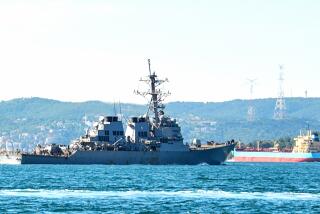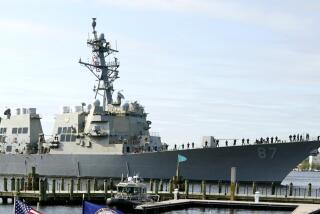Shipping executive wants armed security on his vessels
- Share via
WASHINGTON — The chief executive of a shipping company urged Congress on Tuesday to pass legislation allowing vessels to carry armed security.
Testifying before a Senate subcommittee, Philip J. Shapiro of Liberty Maritime Corp. said that although an 1819 statute gave ships the right to defend themselves, they still were subject to laws and inconsistent port rules governing whether armed vessels could dock.
Shapiro, referring to attacks last month on the Maersk Alabama and on one of his company’s ships, the Liberty Sun, told the panel that the incidents constituted a “game changer.” He said Liberty Maritime and other shipping companies wanted Congress to “clear the obstacles” that stand in the way of ship operators protecting their crews and cargo with armed force.
“We’re doing everything we lawfully can do, but frankly . . . we need the authority to put guns on our ships, to arm our ships, so that our people can be protected,” Shapiro said.
During the hearing, dramatic footage of the attack on the Liberty Sun showed a small band of pirates firing rocket-propelled grenade launchers and automatic weapons. The Liberty Sun crew, using a number of evasive techniques, was able to repel the offensive.
Until legislation is enacted, Shapiro said, the military must protect ships that fly the U.S. flag. “Our ships need protection now -- not six or nine months from now,” he said.
But the military says it is spread too thin and the sea off the coast of Somalia is too vast to protect U.S. merchant vessels.
Undersecretary of Defense Michele Flournoy told members of the Senate Armed Services Committee in another hearing Tuesday that it was the responsibility of the shipping companies to invest in methods to thwart attacks -- which, she said, many had been reluctant to do.
“Ships from all over the world transit the Gulf of Aden and use the shipping lanes along the east coast of Somalia,” Flournoy said. “But many assume unrealistically that there is no need for more robust shipboard security measures because military forces will always be present to intervene if pirates attack.”
Shapiro said the claim that merchant ship owners had not done enough to protect their vessels was “flat wrong.”
“Our company adopted every measure recommended by international organizations and required by the U.S. Coast Guard’s approved security plan for making the vessel a difficult piracy target and more,” he said.
Sen. Carl Levin (D-Mich.), chairman of the Armed Services Committee, compared onboard security to that used in a shopping mall. He said the responsibility for protecting ships belonged in the private sector.
“We expect folks to provide their own security,” Levin said. “Why should we not expect that ships that are vulnerable going into that area will provide their own security personnel?”
With the Gulf of Aden encompassing more than 1 million square miles of water, about four times the size of Texas, Navy Vice Adm. James A. Winnefeld said it would put a “large dent” in the Navy’s capacity and funding if it had to assign a military security force to each ship in the region.
Flournoy said pirate activity had doubled so far this year compared with 2008, but only a small number of ships -- less than half of 1% of the more than 33,000 that sail around the Horn of Africa each year -- come under attack. In most cases, crews foil marauders by using evasive or defensive actions.
--
More to Read
Sign up for Essential California
The most important California stories and recommendations in your inbox every morning.
You may occasionally receive promotional content from the Los Angeles Times.












